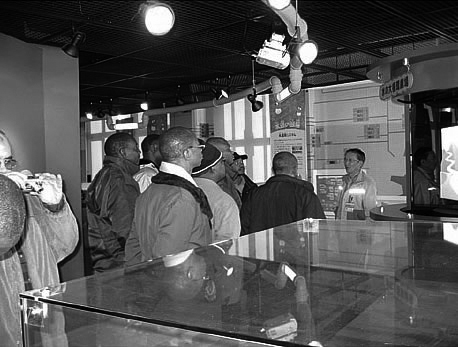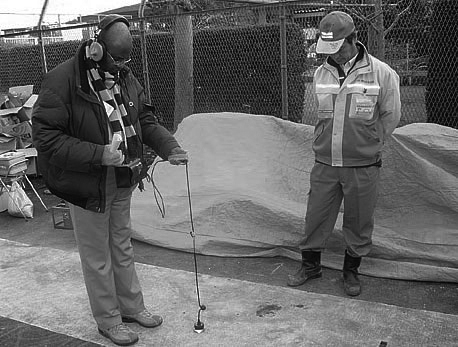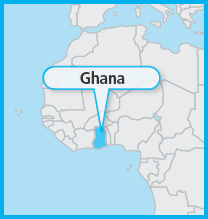Japan's Official Development Assistance White Paper 2009
Column 4 Constantly Supplying Safe Water
— Activities by a Trainee Who Returned to Ghana —
"I am an engineer, so I was very surprised by the high-rise buildings along the water in Yokohama. I would love to visit Japan again." This was the response that Mr. Osei Eagan gave with a smile when asked about his training experience in Yokohama. Mr. Eagan participated in the training program for urban water supply engineers at the Yokohama Waterworks Bureau in January 2009, and he is one of the former trainees who is active in the same field after returning to Ghana.
The training program originated from the Fourth Tokyo International Conference on African Development (TICAD IV) held in Yokohama in May 2008, and it was carried out as a part of technical assistance for African countries, based on cooperation between JICA and Yokohama city. A total of 13 trainees from eight countries (four people from Ghana including Mr. Eagan) learned about water purification technologies, water distribution management and fee collection methods, using Yokohama city as an example. Currently Mr. Eagan leads a section in charge of introduction and maintenances of water-related machinery in the Ghana Water Company, Ltd., making use of the knowledge he acquired during the training.
According to Mr. Eagan, the urban area surrounding its capital Accra does not have sufficient water infrastructure, and approximately half of the water is lost before it reaches houses due to breaks in the pipes and theft, so the income of water supplier is reduced by half. One problem which is characteristic of African countries is that there is a remarkable decrease in the water volume of reservoirs during the dry season, and the water quality deteriorates because of green algae. Large amount of chemical is necessary to improve the quality of the water, which increases costs.
"Just as I had heard, I found Japanese people diligent and kind," says Mr. Eagan of his impression of Japanese people, but he also says that he initially had a hard time at the beginning of the training because of the language barriers. "The staff of Yokohama city interpreted for me and was truly a great help in many ways. They took me to a shrine on my day off, so I was able to have an opportunity to enjoy Japanese culture. But the green tea was more bitter than I had thought it would be," Mr. Eagan recalls of his days in Japan. He often tells his colleagues about the differences in perception between the people of Japan and Ghana towards water, saying, "In Ghana, many people throw away garbage next to water sources, but I was very impressed that in Japan the local residents planted trees and were passionate about protecting water sources."
One of the United Nations Millennium Development Goals (MDGs) is "Halve, by 2015, the proportion of population without sustainable access to safe drinking water and basic sanitation," and access to safe water is a serious problem, not just for African countries. In Ghana, there are still many people who contract infectious diseases because they do not have access to safe water and they use ponds for drinking water. It is expected that Mr. Eagan and other trainees who have returned to their countries will carry out further activities by making use of the knowledge and technologies they had acquired during the training program in order to build safe and secure water supply systems in the future.

Trainee observing Yokohama Water Works Memorial Hall

Survey training with water leakage detector (Photo: JICA)

